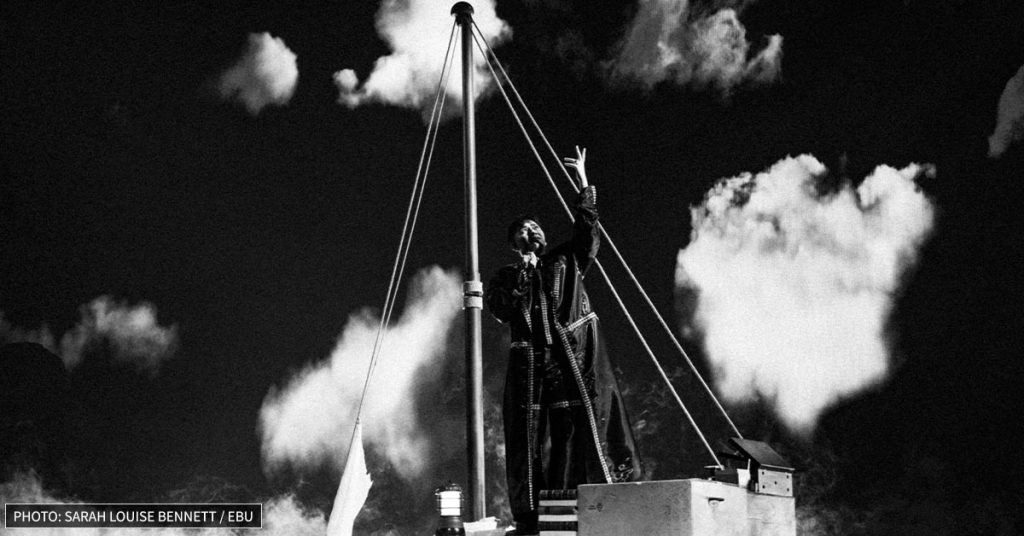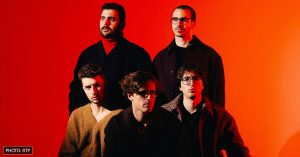
Eurovision 2025 broke records, surprised Europe, and delivered historic moments. What happened in Spain, Germany, Greece, and elsewhere, and which record was shattered during this dramatic final?
The Eurovision 2025 Grand Final, held in Basel, Switzerland, on May 17, 2025, delivered not only dramatic musical moments but also exceptionally impressive viewership figures from numerous countries. What happened across Europe, and what does the complete viewership map look like? All the data is presented below.
Israel: Historic Record-Breaking Figures – For Yuval

According to data from the public broadcaster Kan 11, no fewer than 939,000 people in Israel watched the Eurovision Grand Final-a remarkable figure representing a 32.6% rating, the highest among all channels that day and by a significant margin over competitors.
However, the highlight came during the performance of Yuval Raphael-Israel’s representative in the contest. At that very moment, a peak viewership of 51.3% was recorded. In other words, more than half of Israeli television viewers were watching Yuval. This made Raphael’s performance one of the most-watched moments in the history of Eurovision broadcasts in Israel.
When compared to the historical ratings of Eurovision broadcasts in Israel, Yuval Raphael‘s performance ranks seventh in recent decades. Only exceptional cases surpass it, such as performances during years when the contest was held in Israel (1999 with Eden – 48.2%, and 2019 with Kobi Marimi – 38.2%) and other particularly memorable moments in Israeli Eurovision history (2024 with Eden Golan – 36.8%, 2018 with Netta Barzilai – 35%).
Even during the late-night hours, the Eurovision Grand Final broadcast continued to lead by a wide margin-demonstrating the immense public interest surrounding Yuval‘s performance.
Germany: Highest Final Viewership Since 2016
In Germany, there was a particularly positive surprise-over 9 million viewers watched the Eurovision 2025 Grand Final during the joint broadcast on “Das Erste” and “One”. This figure makes the current final the most-watched in the country since 2016, with an especially impressive market share of 64.3%.
Additional related figures are equally impressive: approximately 5.27 million Germans watched the warm-up show “ESC-Countdown”, while another 3 million continued to watch after the contest ended with “ESC Aftershow”.
The duo Abor & Tynna represented Germany with the song “Baller” and finished in 15th place with 151 points-yet, despite the modest ranking, public interest reached a peak.
France: Female Record and Notable Viewership
 In France, 5.2 million viewers tuned in to the final on the French national broadcaster, with an overall market share of 40% among viewers aged 4 and up. Another interesting figure-53.8% of viewers were women under 50 during the broadcast.
In France, 5.2 million viewers tuned in to the final on the French national broadcaster, with an overall market share of 40% among viewers aged 4 and up. Another interesting figure-53.8% of viewers were women under 50 during the broadcast.
At the broadcast’s peak, viewership surged-centered around the performance of France’s representative, Louane, with the song “maman”. She finished in seventh place with 230 points.
Comparison to previous years in France:
-
2024: 5.4 million – 36.8%
-
2023: 3.4 million – 25.6%
Italy: Slight Decline but High Engagement
 On “RAI 1”, the Italian national broadcaster, about 4.756 million people watched the Eurovision 2025 Grand Final-a slight decrease from 2024, when 5.341 million tuned in. This year’s market share stood at 34% compared to 36% last year.
On “RAI 1”, the Italian national broadcaster, about 4.756 million people watched the Eurovision 2025 Grand Final-a slight decrease from 2024, when 5.341 million tuned in. This year’s market share stood at 34% compared to 36% last year.
For the first semi-final, in which Italy participated, about 2.489 million watched, while the second semi-final drew only 1.616 million viewers.
Italy’s representative, Lucio Corsi, with the song “Volevo essere un duro”, finished in fifth place-a respectable achievement with 256 points.
United Kingdom: Lowest Figure in a Decade
 In the United Kingdom, there was a dramatic drop in interest. An average of just 6.7 million people watched the Eurovision Grand Final on “BBC One”-a decrease of one million viewers compared to the previous year and the lowest figure in the past decade. For comparison:
In the United Kingdom, there was a dramatic drop in interest. An average of just 6.7 million people watched the Eurovision Grand Final on “BBC One”-a decrease of one million viewers compared to the previous year and the lowest figure in the past decade. For comparison:
-
2024: 7.6 million – 57%
-
2023: 11 million at peak
This year, the country had to settle for only 19th place with Remember Monday and the song “What The Hell Just Happened?”, which garnered just 88 points.
Spain: Surprising Surge with High Viewership
 In Spain, there was a significant jump in interest: nearly 5.9 million viewers watched the Eurovision Grand Final on “La 1”-an increase of almost one million compared to 2024. The market share stood at an especially impressive 50.1%. Viewership for the semi-finals was as follows:
In Spain, there was a significant jump in interest: nearly 5.9 million viewers watched the Eurovision Grand Final on “La 1”-an increase of almost one million compared to 2024. The market share stood at an especially impressive 50.1%. Viewership for the semi-finals was as follows:
-
First semi-final, in which Spain participated: 1.384 million (11%)
-
Second semi-final: 804,000 (6.5%)
The representative, Melody, finished only in 24th place with the song “Esa Diva” and 37 points-yet Spanish viewers turned out in large numbers to watch the broadcast.
Greece: 15-Year Record and National Pride
 In Greece, an especially impressive market share of 70.8% was recorded, with an average of 2.755 million viewers for the Eurovision Grand Final-the highest figure in the country in 15 years. In total, at least one minute of the contest was watched by 4.8 million people, with the peak reaching 89.5%.
In Greece, an especially impressive market share of 70.8% was recorded, with an average of 2.755 million viewers for the Eurovision Grand Final-the highest figure in the country in 15 years. In total, at least one minute of the contest was watched by 4.8 million people, with the peak reaching 89.5%.
The representative, Klavdia, with the song “Asteromata,” finished in sixth place-the highest achievement for Greece since 2013, with 231 points. She received congratulations from the president and prime minister, who declared: “Klavdia made us proud and proved that good music and Greek tradition can unite nations without clichés.”
Viewership figures for the contest stages in Greece:
-
First semi-final: 751,000 (19.1%)
-
Second semi-final: 1.653 million (39.6%)
-
Final: 2.755 million (70.8%)
Portugal: 1.3 Million Peak Viewers Despite Overall Decline
 Portugal also saw significant public engagement in the Eurovision 2025 Grand Final, though the figures indicate a slight decrease compared to the previous year. The broadcast on “RTP1” averaged 866,000 viewers throughout the show-representing 8.8% of the audience and a market share of 20.5%.
Portugal also saw significant public engagement in the Eurovision 2025 Grand Final, though the figures indicate a slight decrease compared to the previous year. The broadcast on “RTP1” averaged 866,000 viewers throughout the show-representing 8.8% of the audience and a market share of 20.5%.
However, the most dramatic moments occurred at specific times. During the performance of the band NAPA with the song “Deslocado,” a peak of 1.3 million viewers was recorded-the most-watched moment of the evening on Portuguese television. Later, at the end of the voting phase and the announcement of results, another peak was reached-a market share of 29.7% with about 950,000 viewers.
For comparison, in 2024, Portugal’s average viewership was 924,000, with a viewing rate of 9.6% and a market share of 21.9%. Thus, the 2025 final saw a decrease of about 58,000 viewers, alongside a slight drop in ratings and exposure.
Portugal’s representative this year, the band NAPA, finished in 21st place with just 50 points-a modest achievement, but one that garnered peak public interest during their performance on stage in Basel.
Finland: 45% Viewership Surge Thanks to Two Finnish Acts
 Finland recorded one of the largest increases in Eurovision 2025 viewership rates-with a dramatic 45% rise in Grand Final viewers compared to the previous year. On average, 1.644 million Finns watched the final broadcast on “Yle 1,” and interest in the show was among the highest in the past decade.
Finland recorded one of the largest increases in Eurovision 2025 viewership rates-with a dramatic 45% rise in Grand Final viewers compared to the previous year. On average, 1.644 million Finns watched the final broadcast on “Yle 1,” and interest in the show was among the highest in the past decade.
The explanation for this significant rise lies in the fact that, in addition to the official Finnish representative, Erika Vikman, who competed with the song “Ich komme,” the Swedish band KAJ, which represented Sweden, also had a Finnish background-sparking special curiosity and identification among the local audience.
Over the course of the evening, at least 2.6 million Finns watched some part of the final. Additionally, the broadcast was also available on digital platforms-“Yle Areena,” the “Yle” website, and the app-with a record number of over 500,000 online streams. Full viewership figures for Finland:
-
First semi-final: 808,000 viewers (over 500,000 digital streams)
-
Second semi-final: 932,000 viewers (over 390,000 digital streams)
-
Final: 1,644,000 viewers (over 470,000 digital streams)
Finland itself finished the contest in 11th place with 196 points. Erika received 12 points from the Austrian jury, as well as 10 points from the public in Sweden, Australia, and Estonia-a significant achievement by Finnish standards.
Switzerland: Strong Ratings in Semi-Finals and Youth Viewership Surge
 As the host country for Eurovision 2025, Switzerland enjoyed especially high levels of interest during the semi-final stages-and figures published by the Swiss national broadcaster, SRG SSR, indicate a consistent, multilingual viewing trend. The first semi-final was watched by an average of about 552,000 viewers over the two-and-a-half-hour broadcast. At peak moments, this figure rose to 605,000 viewers.
As the host country for Eurovision 2025, Switzerland enjoyed especially high levels of interest during the semi-final stages-and figures published by the Swiss national broadcaster, SRG SSR, indicate a consistent, multilingual viewing trend. The first semi-final was watched by an average of about 552,000 viewers over the two-and-a-half-hour broadcast. At peak moments, this figure rose to 605,000 viewers.
What made the broadcast particularly impressive was the distribution of viewership among the country’s different audiences. On “SRF1”-the German-speaking channel-a market share of 43% was recorded; on the French-speaking “RTS1,” 34%; and on the Italian-speaking “RSI LA1,” a market share of 39%. These are especially strong figures, indicating broad engagement across all population groups in the country.
The second semi-final was watched by an average of 594,000 viewers-an increase of 42,000 compared to the first semi-final. In German-speaking Switzerland, a particularly interesting trend was observed: a 29% surge in viewership among younger audiences-demonstrating that the broadcast successfully attracted a new generation of Eurovision fans.
Switzerland is a unique example in Europe, with its three main linguistic regions-German, French, and Italian-all enjoying dedicated contest broadcasts. The three networks worked together as part of the host broadcasting team for Eurovision 2025 in Basel, delivering extensive and culturally tailored coverage to every sector of the Swiss population.
Australia: Hundreds of Thousands Tune In-But No Finalist
 In Australia, which is not a European country but has participated in Eurovision for a decade, there was notable viewership engagement this year-even if slightly lower compared to past peaks. In total, over 450,000 viewers watched the Eurovision 2025 Grand Final live and on replay, according to the Australian national broadcaster, SBS.
In Australia, which is not a European country but has participated in Eurovision for a decade, there was notable viewership engagement this year-even if slightly lower compared to past peaks. In total, over 450,000 viewers watched the Eurovision 2025 Grand Final live and on replay, according to the Australian national broadcaster, SBS.
During the live broadcast, which aired early in the morning Australian time, an average of 284,000 people tuned in-an increase of 75,000 compared to last year’s final. Conversely, the replay broadcast during prime time drew only 169,000 viewers-a decrease of 57,000 compared to 2024. In total, the final broadcast reached a cumulative audience of 453,000 viewers.
Beyond the main broadcast, SBS reports that the entire contest-including both semi-finals and the final-was broadcast six times throughout the week, reaching over 2.21 million viewers. Additionally, 172,000 people watched via the channel’s VOD service.
Full Eurovision 2025 viewership figures for Australia:
-
First semi-final (live): 142,000 viewers
-
First semi-final (replay): 165,000 viewers
-
Second semi-final (live): 152,000 viewers
-
Second semi-final (replay): 195,000 viewers
-
Final (live): 284,000 viewers
-
Final (replay): 169,000 viewers
Australia was represented this year by the singer Go-Jo with the song “Milkshake Man”-but to viewers’ disappointment, Australia narrowly missed qualifying for the final. The country finished 11th in the second semi-final, with just 41 points-10 points short of the 10th place required to reach the final, which was taken by Armenia.
Despite the disappointment, the viewership figures show that Australia maintains relatively high engagement and continues to be one of the most Eurovision-identified non-European countries.
Sources: ESC Portugal, ERT, Eurofestivales, eurovoix, Puremédias, DWDL.de, RAI, Finnpanel, Yle, SRG SSR, SBS
Eurovision 2025: The 69th Eurovision Song Contest was held in the city of Basel, Switzerland, on May 13, 15, and 17. This marked the third time that Switzerland hosted the contest, after last hosting it in 1989 in the city of Lausanne. The host venue for the competition was St. Jakobshalle, which has a capacity of 12,400 seats. This was the first time that Basel hosted the contest.

